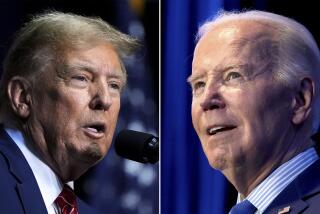McCain’s stance alienates many
WASHINGTON — Sen. John McCain’s vocal support for sending more U.S. troops to Iraq has set him apart from most of the emerging crop of major presidential contenders. And that position could harm his political prospects, according to a Los Angeles Times/Bloomberg poll.
More than one-third of those polled -- 36% -- said they would be “much less likely” to back the Arizona Republican for the White House because of his position. Six percent said his stand made them “somewhat less likely” to vote for him.
Only 13% said they were somewhat or much more likely to support him because of his embrace of a force escalation; 42% said it had no effect on their view of him; and 3% gave no answer to the question.
Perhaps most ominously for McCain, the survey found that his advocacy of a troop buildup could undercut what has been one of his political strengths: the ability to attract independents.
In the poll, 43% of independents said they were somewhat or much less likely to vote for him because he has backed President’s Bush plan to deploy 21,500 additional troops to Iraq.
Among Democrats, 59% said McCain’s view made them less likely to support him.
His position helped him only among his fellow Republicans, and within this group the impact was not substantial -- 24% said McCain’s stance made them more likely to support him, 16% said they were less likely to do so, and the rest said that it had no effect or that they did not have an opinion on the matter.
In another sign of the soured public attitude toward the war in Iraq, opposition to the troop increase is a boost for the three leading Democrats expected to square off for their party’s nomination: Sen. Hillary Rodham Clinton of New York, Sen. Barack Obama of Illinois and former Sen. John Edwards of North Carolina.
Among the 1,344 adults interviewed for the poll, 34% said they were more likely to support one of these Democrats for president, knowing of their opposition to troop escalation; 18% said they were less likely to back any of them because of their stance.
Also, 38% said they were more likely to back a presidential candidate who supported a timetable for withdrawing U.S. troops from Iraq, a position the Bush administration has adamantly opposed. Twelve percent said they were less likely to vote for a candidate favoring a specific schedule for withdrawal.
Forty-six percent said the candidate’s position on a timetable would not affect their support, whereas 4% expressed no opinion.
The poll was conducted Saturday through Tuesday; for the entire sample, it has a margin of error of plus or minus 3 percentage points.
*
More to Read
Get the L.A. Times Politics newsletter
Deeply reported insights into legislation, politics and policy from Sacramento, Washington and beyond. In your inbox three times per week.
You may occasionally receive promotional content from the Los Angeles Times.










